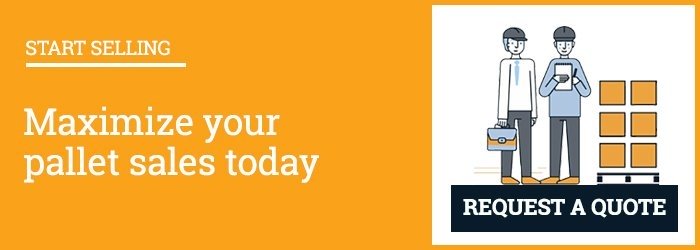Here's how to make an informed decision when selecting a recycled pallet supplier.
With lumber prices at record highs and no end in sight, we’ve been talking about ways to reduce your company’s pallet costs. If you want instant gratification, switch to recycled pallets, a move that can cut as much as 50 percent from your pallet spend.
Don't have time to read the full post now? Get a copy of the checklist for later.
But like any important decision, you don’t want to jump in feet first. There are literally hundreds of suppliers of recycled pallets and just like snowflakes, each one is different. The right supplier is based on your needs and how well the supplier’s capabilities align. Here are things to look for when choosing a recycled pallet supplier.
1) Does the potential supplier have the expertise and resources to evaluate your pallet requirements?
Switching form new to recycled pallets gives you the opportunity to evaluate the pallets your currently using and determine if they’re the right ones for the job. This is particularly helpful if there have been changes in your operation such as automation, new product lines or retail customer requirements.
Ask your potential supplier to visit your facility to assess your current pallets and then recommend the best recycled pallet spec(s) for you. This should be done as a professional service to ensure you get the optimal pallets and pricing.
2) How experienced is the supplier with retail requirements?
Pallets play a critical role in the supply chain. Retailers – particularly larger players – are particular about pallets. Make sure a potential supplier understands the nuances of individual retailer’s requirements and is prepared to respond with the appropriate pallets.
3) How closely do the supplier’s recycled pallet specs align with what you currently use?
This goes hand-in-hand with number one. Specs vary from one pallet supplier to the next. This is particularly true of recycled pallets. A Premium A grade to one company might be a standard A grade to another. Make sure you get a supplier’s specs in writing to ensure alignment in terms of size, quality and performance you need.
If your organization is national or regional, ask potential suppliers how they ensure their pallet grades are consistent from one location to the next. Some suppliers – like 48forty – have published specs and formal quality programs in place to ensure consistent specs regardless of where the pallets originate.
4) Does the supplier have the capacity to keep you supplied?
The majority of recycled pallet suppliers are local or regional companies. Some will offer national coverage through alliances with other suppliers. If your company is national, a supplier with national capabilities is preferable as it simplifies your pallet management and ultimately reduces the time and cost of doing business. (Not to sound biased, but currently there is only one truly national supplier of recycled pallets, 48forty, with 45 brick-and-mortar locations across the U.S. and Canada.)
5) How does the supplier handle order placement, tracking, verification, and billing?
Much of the pallet industry, new and recycled, is paper-based, a system that doesn’t align well with customers that are well supported by operational IT or processes that have moved beyond paper and telephones. Too, paper-based systems add expense to a company’s supply chain. I’m talking about order accuracy and time spent tracking, verifying and billing pallet orders.
Obviously, the better a recycled pallet supplier’s digital capabilities, the better off you will be, even if it’s something as simple as electronic bills of lading.
At 48forty, we’re fortunate that our leadership team is obsessed with being early adopters of all manner of service-enhancing supply chain technology, from the tracking and safety technology in our tractors so we always know where our loads are and driver safety is enhanced to PalTrax™, our online customer portal that enables customers to place orders and pallet retrieval 24/7, view and manage order history, and pull custom reports. I guess you could say we’re a little nerdy – in a good way. At the end of the day, this technology also impacts customers’ bottom lines and saves money.
Consider If Your Needs And The Supplier's Capabilities Align
I know I’ve thrown a lot of information at you in this blog. However, informed decisions are the best way to go. If you have any questions about how you can improve your pallet performance by switching to recycled pallets (or questions about 48forty specifically), please contact us. We're always happy to help.
(This is the final post in our three-part series on making the switch to recycled pallets. See the previous post for a 10-point checklist to ensure you truly understand your company's pallet needs.)


